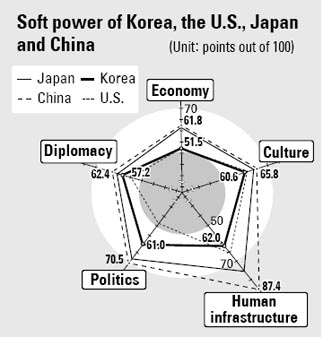Press Release
 In a recent poll, Korea edged out its massive neighbor China in terms of soft power, a country’s ability to indirectly influence the behavior and interest of other countries through nonmilitary and noneconomic tools, such as culture or aid.
In a recent poll, Korea edged out its massive neighbor China in terms of soft power, a country’s ability to indirectly influence the behavior and interest of other countries through nonmilitary and noneconomic tools, such as culture or aid.
The "Global Views 2008: Soft Power in East Asia" survey, jointly conducted by the JoongAng Ilbo, the East Asia Institute in Korea and the Chicago Council of Global Affairs, assessed the soft power of four countries: Korea, China, the United States and Japan. The U.S. came out on top, getting 69.6 points out of 100. Japan came in second, with 66.2 points. Korea earned 58.5 points, followed by China, with 56.3 points. The poll focused on human infrastructure and education, political systems, culture, economy and diplomacy.
Sponsored by the Korea Foundation for International Culture Exchange, the survey asked questions of people in Korea, the United States, Japan, China, Indonesia and Vietnam.
The United States is known for its advanced political system and good education; the country garnered an average of 87.4 points from respondents in terms of education and human infrastructure. Those surveyed also gave good assessments of its Internet technologies and the advantage of speaking the universal language, English.
Japan, with 76.6 points, lagged behind the United States in education and human infrastructure but came out nearly even with the U.S. in other fields. It got negative responses from its neighbors Korea and China, whose assessment of Japan’s education and human infrastructure amounted to an average of only 49.8 and 45.5 points, respectively.
But Southeast Asian countries like Vietnam and Indonesia looked positively on Japan, giving the country an average of 68.4 points and 65.5 points, respectively.
China received an average of only 50.4 points from Korea and 44.8 points from Japan. That number slipped to 35 points among U.S. respondents.
Despite the widespread belief that China will be the next global superpower, the country has yet to win the hearts of its Asian peers, the poll showed. Most recognized China as a threat rather than a partner, based on trust, cooperation, attractiveness and leadership, all principal components of soft power.
Nearly 75 percent of Korean respondents said China is likely to pose a military threat to Korea, far higher than the same concern in Japan (66 percent), or the U.S. (49 percent). Three-quarters of Koreans said they believed that China will become Asia's leader, but 77 percent still said they feel "uneasy" about China rising to superpower status.
Koreans were decreasingly favorable towards the United States, as the country is rocked by public fury over the resumption of imports of U.S. beef. Local opinion of the United States had been rising, from 58 points in the 2004 poll to 61 in a survey from February of this year. But the number skidded to 51 points in the latest poll. Also, slightly less than 40 percent of the Korean respondents said the Korea-U.S. alliance is significant, down from 48.8 percent in 2006.
Overall, the U.S. is armed not only with a mighty dose of hard power but also strong soft power, while China is rapidly rising to become not only the new regional superpower but also a global powerhouse. Japan has quietly maneuvered diplomatically and economically to enhance its standing in the international community.